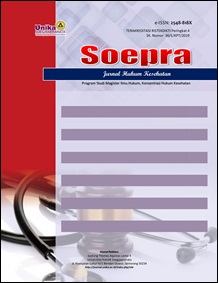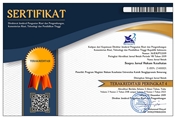The Role of the Government of East Jakarta City in the Control of TB-HIV and the Fulfillment of the Right to Health
Abstract
The research was conducted in the Jakarta Timur area, throughout health care offices and institutions. This study used a sociological juridical approach with analytical descriptive specifications. The data used are primary data through interviews and observation, also secondary data through field and literature studies. The study used the purposive sampling method which includes TB-HIV patients and healthcare providers in health care facilities.
The result of the study indicates that regulation regarding the Jakarta Timur government’s role in TB-HIV eradication has been created however separately, HIV regulation in Peraturan Daerah DKI Jakarta No. 5 Tahun 2008 and TB regulation in Peraturan Gubernur DKI Jakarta No. 28 Tahun 2018. Moreover, the collaborative regulation that has been created in the form of Surat Edaran Suku Dinas Kesehatan Kota Administrasi Jakarta Timur No. 50053/1.772.11, is not legally binding. Thus, the Government’s role in eradicating TB-HIV still encounters few factors that hinder its implementation thus the rights to health haven’t entirely fulfilled. Influencing factors are juridical, sociological, and technical factors. The juridical factors are the existence of regulation in TB-HIV eradication, however separately and the lack of legal binding in Surat Edaran to regulate TB-HIV eradication. The sociological factors are lack of patients’ medication compliance, healthcare provider’s stigma and violation of medical confidentiality. The technical factors are the TB-HIV collaboration team that hasn’t been arranged in health care facilities, overlap in TB-HIV reporting mechanism, availability of medication and funding that rely on donor’s contribution.
Keywords
Full Text:
PDFReferences
Ali, Zainuddin. (2009). Sosiologi Hukum, Jakarta: Sinar Grafika
Anderson Laura, et al. (2018). Global Tuberculosis Report 2018, Geneva: World Health Organization.
Peraturan Perundang-Undangan
RI, Undang-Undang Dasar 1945
RI, Undang-Undang Nomor 4 Tahun 1984 Tentang Wabah Penyakit Menular
RI, Undang-Undang Nomor 39 Tahun 1999 Tentang Hak Asasi Manusia
RI, Undang-Undang Nomor 29 Tahun 2004 Praktik Kedokteran
RI, Undang-Undang Nomor 36 Tahun 2009 Tentang Kesehatan
RI, Undang-Undang. Nomor 44 Tahun 2009 Tentang Rumah Sakit
RI, Undang-Undang Nomor 23 Tahun 2014 Tentang Pemerintahan Daerah
RI, Undang-Undang Nomor 36 Tahun 2014 Tentang Tenaga Kesehatan
RI, Peraturan Daerah Provinsi Daerah Khusus Ibukota Jakarta Nomor 5 Tahun 2008 Tentang Penanggulangan HIV dan AIDS
RI, Peraturan Menteri Kesehatan Nomor 21 tahun 2013 Tentang Penanggulangan
HIV dan AIDS
RI, Peraturan Menteri Kesehatan Nomor 82 Tahun 2014 Tentang Penanggulangan
Penyakit Menular
RI,Peraturan Menteri Kesehatan Nomor 67 Tahun 2016 Tentang Penanggulangan Tuberkulosis
RI, Peraturan Gubernur Provinsi Daerah Khusus Ibukota Jakarta Nomor 28 Tahun
Tentang Penanggulangan Tuberkulosis
RI, Peraturan Gubernur Provinsi Daerah Khusus Ibukota Jakarta Nomor 233 Tahun 2014 Tentang Organisasi dan Tata Kerja Dinas Kesehatan
Jurnal
Wahyati, Endang: “Withdrawing Life Supports Therapy in Human Rights Perspective.”, 2018, Journal of Advances in Health and Medical Sciences, Volume 4, No.2, Tahun 2018, hal. 34
Isriawaty, Fheriyal, Sri. (2015). “Tanggung Jawab Negara Dalam Pemenuhan Hak Atas Kesehatan Masyarakat Berdasarkan Undang Undang Dasar Negara Republik Indonesia Tahun 1945. Jurnal Ilmu Hukum Legal Opinion, Volume 3, No.2, Tahun 2015, hal. 1–10.” diakses dari http://jurnal.untad.ac.id/jurnal/index.php/LO/article/view/5867/4622
F. Naili Akrima., Indarjo, Sofwan. (2018). “Implementasi Kebijakan Permenkes
Nomor 67 Tahun 2016 Tentang Penanggulangan Tuberkulosis.” Higeia Journal of Public Health Research and Development, Volume No.2, ISSN 1475-362846.”
Diakses dari https://journal.unnes.ac.id/sju/index.php/higeia/article/view/21291/10 865
Andriani, Aida., Izzati, Wisnatul. (2018). :”Analisa Pelaksanaan Program Penanggulangan HIV Dan AIDS Di Dinas Kesehatan Kota Bukittinggi.”, Jurnal Endurance, V olume 3” diakses dari http://ejournal.kopertis10.or.id/index.php/endurance/article/view/2828
Internet
UNAIDS. (2018). Global HIV & AIDS Statistics: 2018 Fact Sheet. Retrieved from: https://www.unaids.org/sites/default/files/media_asset/UNAIDS_FactSheet_en.pdf
DOI: https://doi.org/10.24167/shk.v5i2.2564
Refbacks
- There are currently no refbacks.
Copyright (c) 2019 SOEPRA: Jurnal Hukum Kesehatan







